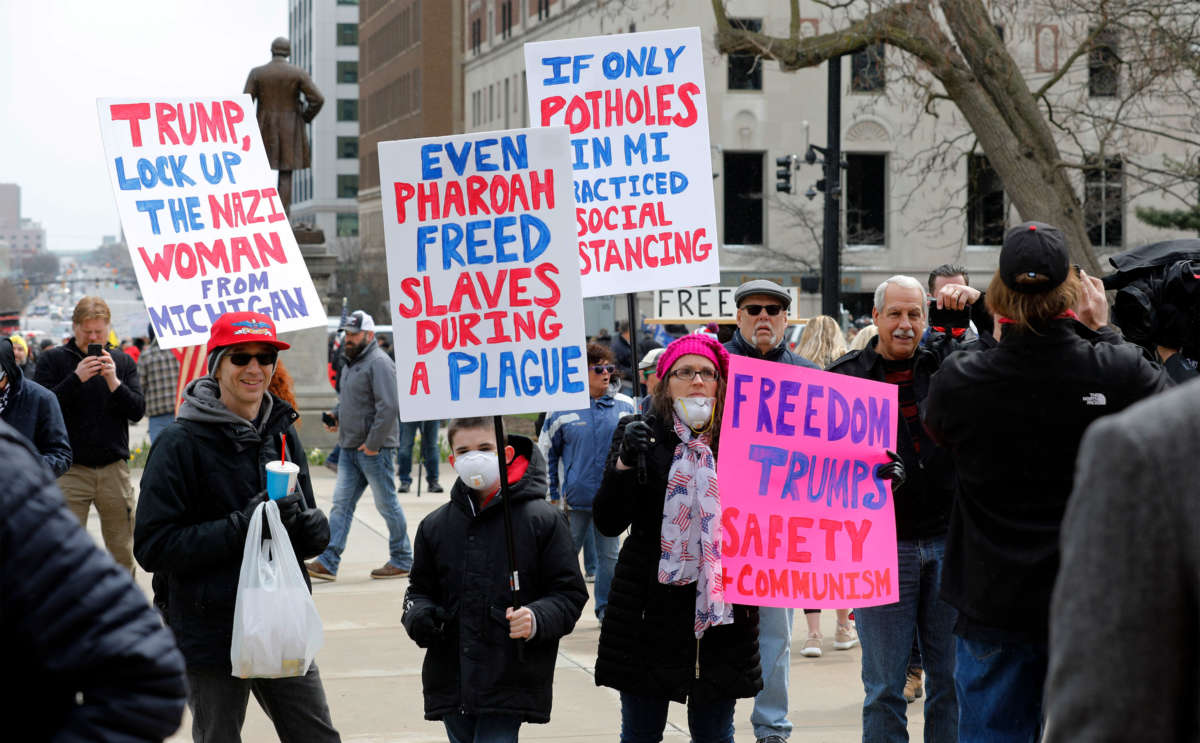Part of the Series
Despair and Disparity: The Uneven Burdens of COVID-19
While stay-in-place orders across the country continue to remain in place with the support of the overwhelming majority of Americans, right-wing demonstrators have decided to engage in street protests against the measures — potentially causing more harm at a time when social distancing is necessary to control the spread of COVID-19.
In Lansing, Michigan, on Wednesday, thousands of protesters, calling themselves “Operation Gridlock,” sought to surround the state capitol building, hoping also to cause a traffic jam in the process.
Protesters held a number of signs denouncing Gov. Gretchen Whitmer (D-Michigan) and were shouting chants of “lock her up” during the event, reminiscent of how supporters of President Donald Trump reacted in the 2016 presidential race whenever Democratic Party nominee Hillary Clinton’s name was mentioned.
Whitmer herself is on the short list of possible choices for vice-presidential running mate of presumed 2020 Democratic presidential nominee Joe Biden.
Protesters waved a number of American, Confederate and pro-Trump flags. Many held signs denouncing the governor’s actions as well.
Whitmer discussed the protest on Wednesday evening during an interview on MSNBC. She expressed support for the right to free speech, but noted that many of the protest-goers were engaged in actions that were potentially harmful to public health — including handing out candy to children without wearing protective gear, according to MLive.com.
The governor also suggested the protesters were harmful in more ways than one. In addition to potentially increasing the spread of coronavirus, participants also temporarily blocked an ambulance from being able to reach a hospital parking bay, she noted.
The protests were more political in tone, according to Whitmer, than about reopening the state’s economy.
WATCH: Gov. Whitmer says today's protest at Michigan's Capitol is "the kind of behavior that extends the need for stay-at-home orders."
"It was a political rally that is going to endanger people's lives because this is precisely how COVID-19 spreads."https://t.co/hZ1sjeUUSI pic.twitter.com/wd3ZTAEQgC
— MSNBC (@MSNBC) April 15, 2020
Some rally-goers, for example, were carrying signs that were anti-choice, or were brandishing assault weapons, Whitmer said — topics unrelated to the current crisis.
“It wasn’t really about the stay-at-home order at all,” Whitmer said. “It was essentially a political rally, a political statement that flies in the face of all of the science and all of the best practices from the stay-at-home order that was issued.”
The actions of the protesters, the governor added, undoubtedly caused more social harm than good.
“We’ll never know the precise number of COVID-19 cases that come as a result of this gathering, but we know that there will be some,” Whitmer said.
Michigan has been hit hard by the COVID-19 pandemic, with more than 28,000 confirmed cases of the disease being identified so far within the Great Lakes State. In terms of cases discovered, only three other states in the U.S. have a higher number.
Whitmer’s response to COVID-19 has, for the most part, been received well by her constituents. According to polling conducted last month by Baldwin Wallace University, 69 percent of Michiganders approve of her response to the pandemic, while 21.5 percent say they disapprove.
In her MSNBC interview, Whitmer suggested that the protest did not represent the views of most Michiganders.
“This looks like a lot of people, and it felt like a lot of people, but in the bigger scheme of things, Michigan is a state of 10 million people, the vast majority of whom are doing the right thing,” she added.
Join us in defending the truth before it’s too late
The future of independent journalism is uncertain, and the consequences of losing it are too grave to ignore. To ensure Truthout remains safe, strong, and free, we need to raise $46,000 in the next 7 days. Every dollar raised goes directly toward the costs of producing news you can trust.
Please give what you can — because by supporting us with a tax-deductible donation, you’re not just preserving a source of news, you’re helping to safeguard what’s left of our democracy.
